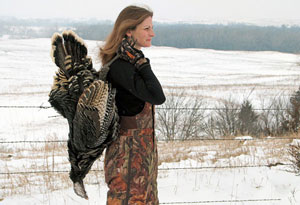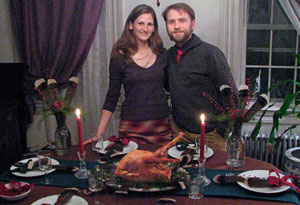
Photo: Courtesy of Kimberly Hiss
Animal-loving hunter Kimberly Hiss sets out to reclaim her place in the food chain by killing her own holiday turkey.
My Christmas dinner was up in one of those trees. It was snowing lightly on a minus-two-degree dawn, and I was lying on my belly bundled in white camo, pointing the muzzle of a Benelli 12-gauge through a cluster of fireweed. The cold hurt my hands in a way I wondered if I should worry about. In front of me, a snow-coated field stretched for 500 yards to a line of bare trees silhouetted against a blush of sunrise. The trees' branches were dotted with roosting turkeys, and their occasional gobbles carried back across the field to where I waited, breathing into my face mask. Next to me, rising on his knees to better see the birds, was Brent Lawrence, a friend who worked for the National Wild Turkey Federation, a nonprofit conservation group. We were hunting together outside the town of Kearney, Nebraska, for three days in December—one of which had already passed. Now he tapped my shoulder and pointed: The dots had started flapping to the ground, and single-file lines of birds were bobbing into the field, their chatter echoing in the cold air. I took a deep breath and adjusted my grip on the gun.
Id started hunting a few years before, shocking everyone who knew me. Not only am I a sucker-hearted animal lover who includes my cats' names on the answering machine, the closest I'd ever come to a firearm was a cardboard prop in a school production of Annie Get Your Gun. But in 2003 I fell into an assistant position at Field & Stream magazine; then I was invited on a mule deer hunt, and then I had some thinking to do.
My reformative logic went like this: For every turkey wrap or club sandwich I'd ever eaten, something had been killed for my benefit—I'd just never done the killing myself. The deer hunt invitation seemed an opportunity, a challenge even, to reclaim my place in the food chain by assuming responsibility for the meat on my plate.
I took shooting lessons and a hunter safety course, and headed to New Mexico. I killed a buck the second morning and cried with its big head in my arms. Then I skinned it, butchered it, and shared its meat with my curious friends back home in the Bronx. From there I hunted ducks in Oregon, antelope in Wyoming, and geese in Pennsylvania. But the hardest hunts I attempted were for turkeys, which have exceptionally keen hearing and eyesight. They had ditched me in New Mexico, New York, and Ohio. Still, I was hoping that this was the year I'd get one—in time for Christmas.
Brent ducked below the reeds. "They're close," he whispered. "To your right." I flattened myself in the snow, my heart pounding. And there they were—a dozen big, dark birds popping out one by one from behind a rise 40 yards away. I clicked my safety off and watched for a good shot. But they never seemed still enough. Or close enough. Or far enough away from each other.
This happens every time. As much as I love hunting—the connection with nature, the pure nutrition it provides—I don't like the killing part. I arrive at this moment conflicted, struggling with a mix of reluctance, doubt, and advance repentance. Eventually the flock moved on and I exhaled, unsure whether I felt grateful or pissed at myself.
Suddenly Brent hit the ground again. "They're right there," he hissed as another group of birds filed into the same field. Gradually the turkeys spread out, and one wandered a little closer to us. It pecked at the ground, then raised its head and stood perfectly still for one moment. I squeezed the trigger.
The blast of the gun is always a bit of a surprise—more like something that happens to me than something I initiate. All at once, my ears were ringing, the turkey was thrashing in the snow, and Brent and I were racing down the hill toward it.
"Don't worry; it's dead," he shouted. Though its wings were flapping, its head was limp on the ground. I wanted to look away but didn't—this was part of my responsibility. When the bird was still, I knelt next to her and put my gloved hand on top of her feathers. I always try to somehow commemorate the taking of a life, but I have yet to come up with the right words. The ones that move through my head are usually I'm sorry and, finally, thank you, and that's how my sort-of prayer went now. I looked up to see a cow in a nearby field, her big eyes watching. And I felt an overwhelming, almost sleepy sense of complete relief.

Photo: Courtesy of Kimberly Hiss
That afternoon we headed to the local Game and Parks facility to pluck and clean the bird—which took forever because I was so reluctant to dismantle this amazing animal. Its feathers were far more beautiful than I'd given turkeys credit for. When the body was bare, we removed the head and wings, then did the gutting, and out of curiosity opened the stomach, which was full of green grasses—the very definition of an organic diet. Then I put my bird (and a bag of its prettiest feathers) in a Christmas-red cooler for the trip home.
The job done, I made a Walmart run for more ice packs. A woman in line ahead of me was buying a roasted chicken in a plastic container. I wondered where her bird had come from.
Christmas morning dawned white and crisp at my parents' farmhouse in Rhode Island. My boyfriend and I were up early to soak the turkey in brine. I wanted so much for my family to enjoy the feast I was about to provide. They'd been surprised and even a little upset when I'd started hunting, but they tried to be supportive. "It'll be great," my boyfriend promised with a kiss on the forehead. Then we headed into the woods to gather holly greens for table decorations.
In the late morning, with our snow-crusted boots dripping by the fireplace, we set to work on the turkey. We patted off the brine, filled the bird with homemade stuffing, covered it with strips of bacon, and sealed it inside a roasting bag—to keep the lean, wild meat from drying out in the oven—along with some freshly chopped potatoes, carrots, and celery.
The timer set, we spread the greens on the kitchen table, along with ribbons and long, elegant tail feathers, and made two vase arrangements and six place settings. I'd donate the rest of the feathers to the National Wild Turkey Federation, which sends them to Native American tribes for ceremonial use.
By 4:30, the bird was perfectly cooked, and I carried it to my family at the table. It looked rich and golden, and the meat was tender, almost sweet, and flavorful in a way none of us had realized turkey could be. My sister said it tasted more "normal" than she had expected. My boyfriend found the first pellet of shot in his slice. I sat back with my wine, watching my family talk and laugh in a glow of candlelight, occasionally passing plates for seconds.
I was in bed when I realized I'd forgotten the wishbone. I hurried downstairs, prepared to dig it out of the trash, but someone had set it on the windowsill. I took it into the living room and curled up on the couch. The Christmas tree was dark, and the fire was nearly out. Holding one end of the fabled bone in each hand, I wondered if I would ever get over my ambivalence about killing—and whether I wanted to. Maybe it should be hard, and should change me a little bit each time. I can still feel the weight of the deer's big head. I can still see the antelope's rough face at my feet. I can still hear the turkey's wings slapping the snow. And I value those moments as some of the most authentic of my life.
I looked at the bone. We'd break it in the morning, probably my sister and I. As if my bird hadn't provided enough, it would also grant us a wish.
Get Ready for Thanksgiving
The job done, I made a Walmart run for more ice packs. A woman in line ahead of me was buying a roasted chicken in a plastic container. I wondered where her bird had come from.
Christmas morning dawned white and crisp at my parents' farmhouse in Rhode Island. My boyfriend and I were up early to soak the turkey in brine. I wanted so much for my family to enjoy the feast I was about to provide. They'd been surprised and even a little upset when I'd started hunting, but they tried to be supportive. "It'll be great," my boyfriend promised with a kiss on the forehead. Then we headed into the woods to gather holly greens for table decorations.
In the late morning, with our snow-crusted boots dripping by the fireplace, we set to work on the turkey. We patted off the brine, filled the bird with homemade stuffing, covered it with strips of bacon, and sealed it inside a roasting bag—to keep the lean, wild meat from drying out in the oven—along with some freshly chopped potatoes, carrots, and celery.
The timer set, we spread the greens on the kitchen table, along with ribbons and long, elegant tail feathers, and made two vase arrangements and six place settings. I'd donate the rest of the feathers to the National Wild Turkey Federation, which sends them to Native American tribes for ceremonial use.
By 4:30, the bird was perfectly cooked, and I carried it to my family at the table. It looked rich and golden, and the meat was tender, almost sweet, and flavorful in a way none of us had realized turkey could be. My sister said it tasted more "normal" than she had expected. My boyfriend found the first pellet of shot in his slice. I sat back with my wine, watching my family talk and laugh in a glow of candlelight, occasionally passing plates for seconds.
I was in bed when I realized I'd forgotten the wishbone. I hurried downstairs, prepared to dig it out of the trash, but someone had set it on the windowsill. I took it into the living room and curled up on the couch. The Christmas tree was dark, and the fire was nearly out. Holding one end of the fabled bone in each hand, I wondered if I would ever get over my ambivalence about killing—and whether I wanted to. Maybe it should be hard, and should change me a little bit each time. I can still feel the weight of the deer's big head. I can still see the antelope's rough face at my feet. I can still hear the turkey's wings slapping the snow. And I value those moments as some of the most authentic of my life.
I looked at the bone. We'd break it in the morning, probably my sister and I. As if my bird hadn't provided enough, it would also grant us a wish.
Get Ready for Thanksgiving




